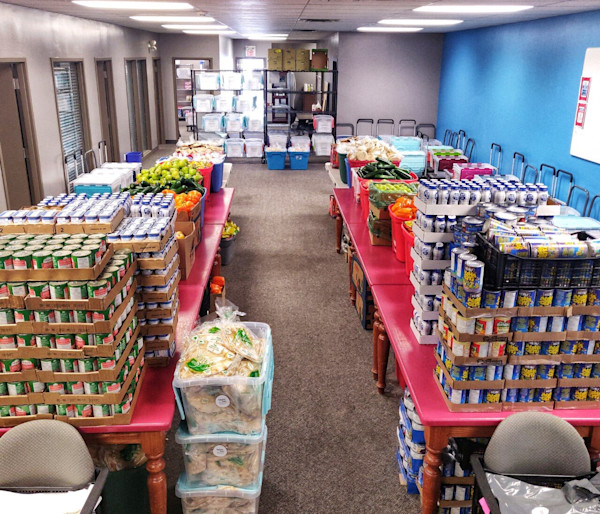Putting hope on the table with Food4Kids Waterloo Region
March 16, 2021

The COVID-19 pandemic has affected everyone – from our frontline health care workers to those of us lucky enough to work from home. Many schools have programs to help those children whose families don't have enough food. But what happens to those children when school is not in session?
The COVID-19 pandemic has affected everyone – from our frontline health care workers to those of us lucky enough to work from home. For those workers who have lost their employment due to the pandemic, food insecurity has become a new challenge. Across our communities, food banks have seen an increase in new families seeking assistance. Having regular, nutritious meals is essential to everyone – especially for children in school. Many schools have programs to help those children whose families don't have enough food. But what happens to those children when school is not in session?
That's the question that drove longtime community organizer Kelly-Sue Oberle to start Food4Kids Waterloo Region. After retiring from her previous role at Nutrition for Learning, Kelly-Sue kept finding people were asking about nutrition for those students on the weekends and during holidays. These are children ages one to 14 who live with chronic hunger, and Kelly-Sue said the number of children in our community that fall into this category is anywhere from 2,500 to 4,000.
We sat down with Kelly-Sue to learn more about Food4Kids Waterloo Region and the families they help.
Thank you for making time for us. Can you tell us a little about how you got started?
Well, I used to be the executive director of Nutrition for Learning, a snack program operating within local schools. What used to bother me was whenever I would get out and do these large presentations to big groups, the question on the floor was always, "well, who feeds the really needy kids when they go home?" It bothered me enough that when I retired in 2016, I looked into it. There was another smaller program in Hamilton running, and I went and talked to them and said, you know, I'm going to take some of what you're doing and take it to Kitchener and modify it for our community. We started the very first program with 19 kids in my dining room in January 2017. We've gone from feeding 19 children in 2017 to feeding over 850 kids.

How do you get connected with the families who need help?
Everything is done through the school boards. They identify the children, and then they reach out to the families. The families then fill out a form – it's not a means test – it's just a way for us to understand the number of kids in their family and any allergies, so we know what not to send home.
Have you seen an uptake because of COVID?
We've had many requests to move into new schools, which we can't do until September. We had 95 children that were already in the schools we operate in, so we could add them on. COVID has been very, very hard on everyone. It's changed how we operate from week to week. We did have a period in March, when it first started, where we couldn't get food to the kids. We had to give them grocery cards because we couldn't get the food.
How does your program and the families you serve differ from food bank programs?
One way we differ so dramatically from other programs is that our families cannot access things easily. They don't have vehicles. They're often single-parent families. They have to take their kids with them wherever they're going. It makes it very difficult for them to access services. We ensure that the food gets directly to the children at the school to take it home. They get proteins, cereals, grains, fresh fruits, and vegetables, enough to last them all weekend.
We can imagine the impact of schools being closed due to the pandemic. How is the food normally distributed?
It depends on the program. For our weekend programs, the food goes to the schools on Fridays, and the kids would take it home from school. For a larger family, often, the parents will walk down and pick it up. When they're on holidays – there are 12 to 13 weeks of holidays every year – we deliver directly to the homes. So that is what we ended up doing from March 20th to June 30th last year. We were delivering directly to homes for all 600 kids.
It must be challenging to hear some of the stories.
It is. We had a call at the very beginning of the pandemic from a principal who had three kids under seven, and the kids were losing weight. They're coming to school, and they're losing weight. That is not a good thing. It's not just about feeding children's tummies and making them healthy; it's making them feel safe. Many are afraid to tell anyone because food is not the only thing that they have issues with. They are scared to tell you that they're hungry because if they tell you they're hungry, there might be an issue with someone coming to the home. There could be a chance that the only bit of stability they have in their lives, which is their parent, could be taken away. The other thing that they're even more apt to feel is that they'll tell you that they're hungry and you won't care. That's the part where that is so detrimental to a child. We're supposed to find solutions for children when they have any issue, but when you're hungry, that shouldn't happen. We always say we're putting hope on the table. It's not just food because when a child brings food back home and puts it on the counter, they're providing something for their family. They look to their parents to see what their reactions are going to be. We asked one of the kids what's the best thing in your bag? They said it makes my mom smile.
A portion of the proceeds of every Chocolate Soup Gift Box is donated to Food4Kids. How did you get connected with us?
That came through a really wonderful man, Cameron Redmond, who we call a hunger hero here. They're people who see the program's value, and then automatically, their minds go to how we can connect with another organization or business to make something happen. He called Dan and said, we have this opportunity, and you have this great business, so why don't we try and work together. That's how it happened. So it's great people in our community who come up with wonderful ideas that help our kids and help our businesses be more philanthropic. The benefit for us is more than the donation. There's also a card in your phenomenal boxes that talks about our organization. It builds awareness for us with more businesses.
To learn more about how you can get involved with Food4Kids Waterloo Region, visit their site.
Get Started
Start building your recognition culture with us today.
Ready to make a difference in your employees’ lives and watch your company culture thrive? Contact us to speak with a member of our passionate team.

